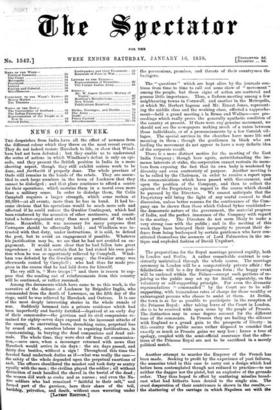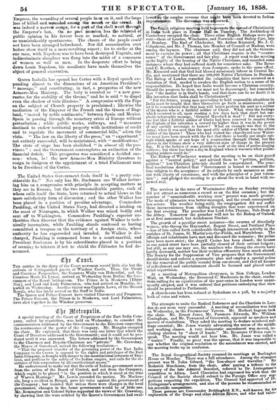NEWS OF THE WEEK.
THE despatches from India have all the effect of newness from the different colour which they throw on the most recent events. They do not indeed restore Havelock to life, or show that Wind- ham had not been defeated. ; but they enable us to understand the series of actions in which lirindham's defeat is only an epi- sode, and they present the British position in India in a more cheering wiped, though they still exhibit serious work to be done, and forthwith if properly done. The whole province of Onde still remains in the hands of the rebels. They are assem- bled in such large numbers in the town of Lucknow that they cannot be dislodged ; and that place continues to afford a centre for their operations, which sustains them in a moral even more than a military sense. In order to dislodge them; Sir Colin Campbell requires a larger strength, which some reckon at 30,000—at all events, more than he has in hand. It had be- come obvious that his operations would be much more safe and effectual if he could reduce the Gwalior Contingent, which had been reinforced by the accession of other mutineers, and consti- tuted a better-organized army than most portions of the rebel force. Meanwhile, it was necessary for many purposes that Cawnpore should be effectually held ; and Windham was in- trusted with that duty, under instructions, it is said, to defend the post, but to avoid. an engagement if possible. Whatever his justification may be, we see that he had not avoided an en- gagement. It would seem clear that he had fallen into great imprudence ; and it is certain that he had risked his own posi- tion when he was so opportunely relieved by Campbell. Wind- ham was defeated by the Gwalior army : the Gwalior army. was afterwards routed by Campbell ; who bad thus far made pro- gress in the course that he had laid down for himself.
The cry still is, "More troops ! " and there is reason to sup- pose that the sending out of reinforcements from this country will be continued, or rather resumed.
Among the documents which have come to us this week, is the narrative of the defence of Lucknow by Brigadier Inglis, who commanded from the death of Lawrence, on the fifth day of the siege, until he was relieved by Havelock and Outram. It is one of the most deeply interesting stories in the whole annals of war. Suddenly hemmed. into a private residence which had been imperfectly and hastily fortified—deprived at an early day of their commander—the garrison and its civil companions re- mained for eighty-seven days exposed to the incessant attacks of the enemy, to enervating heats, drenching rains, perpetual loss by armed attack, ceaseless labour in repairing fortifications, in countermining, in burying the dead companions and dead ani- mals. The whole time, they were shut off from all communica- tion,—save once, when a messenger returned with news that Havelock would arrive in six days : the six days passed, and thirty-five besides, without a sign ! Throughout this time the devoted baud undertook duties as if—what was really the ease— the safety of the whole depended upon the perpetual exertions of each. The officers shouldered the musket and took duty as sentry equally with the men ; the civilian played the soldier ; all without distinction of rank handled the shovel in the burial of the dead ; the women did work as cooks and. as nurses ; and even the Na- tive soldiers who had remained "faithful to their salt," and. formed part of the garrison, bore their share of the toil, haTtlehiP, privation, and. death, without once wavering under (Linn brim.] the persuasions, promises, and threats of their countrymen the besiegers.
The " questions " which are kept alive by the journals eon- tiuue from time to time to call out some show of " movement " among the people, but these signs of action are scattered and possess little importance. Thus, a Reform meeting among a few neighbouring towns in Cornwall, and another in the Metropolis, at which Mr. Herbert Ingram and Mr. Ernest Jones, represent- ing the middle class and the working class, effected a rapproche- ment—held a grand. meeting a la Brace and Wallace—are pro- ceedings which really prove the generally apathetic condition of the country at present. If there were any genuine movement, we should. not see the newspapers making much of a union between those individuals, or of a pronunciamento by a few Cornish vil- lages. The special services in the churches have more life and meaning in them ; though the gentlemen in black who are leading the movement do not appear to have a very definite idea of the corporate result.
There is a more distinct motive for the meeting of the East India Company ; though here again, notwithstanding the im- mense interests at stake, the corporation cannot restrain its mem- bers from exposing the fact that its own body is weakened. by diversity and even contrariety of purpose. Another meeting is to be called. by the Chairman, in order to receive a report upon the communications which have passed with Government, and upon the position of the Company, and. then to collect the opinion of the Proprietary in regard. to the course which should be pursued. by the Directors. We cannot anticipate that the Proprietary will bring the light of any useful counsel to that discussion, unless better reasons for the continuance of the Com- pany can be shown than those which Colonel Sykes ventilated— the democratic nature of the government, the material progress of India, and the perfect innocence of the Company with regard to the mutiny. The Directors do not seem likely to make a very strong case with the public ; and in the meeting of this week they have betrayed their incapacity to prevent their de- fence from being burlesqued. by certain gentlemen who have con- stituted themselves the accusers of Lord Palmerston in the an- tique and exploded fashion of David Urquhart.
The preparations for the Royal marriage proceed rapidly, both in London and. Berlin. A. rather remarkable contrast is con- siOently maintained through the whole course. The marriage ceremony in London will be a comparatively private affair ; the felicitations will be a dry drawingroom form ; the happy event will be enclosed. within the Palace—except such pertions of re- joicing as the public may set up for itself, separately, on the voluntary or self-supporting principle. For even the dramatic representations " commanded" by the Court are to be self- supporting, with tremendous rates of charge for those wealthy or extravagant persons who choose to assist at them. At Berlin, the town is as far as possible to participate in the reception of the Princess Royal : after taking leave of the Court in London, she is to be received with open arms by the people of Prussia. The distinction may in some degree account for the different tone of the comments. In Prussia they are hailing the alliance with England as a grand. gain to the prospects of liberty : in this country the public seems rather disposed to consider that exactly as much as Prussia gains we may lose ; hence a tone of apology, coupled with the semi-official assurance that the affec- tions of the Princess Royal are not to be sacrificed in a merely political match.
Another attempt to murder the Emperor of the French has been made. Seeking to profit by the experience of past failures, the assassins tried. in this case to carry out a design which had before been contemplated though not reduced to practice—to use neither the dagger nor the pistol, but an explosive of the grenade order. They thus hoped to effect by scattering missiles broad- cast what had hitherto been denied to the single aim. The cruel desperation of their contrivance is shown in the results,— the shattering of the carriage in whioh Napoleon sat with the Empress, the wounding of seversil people in or on it, and the large Ices of killed and wounded among the escort or the ere*. It was indeed a narrow escape, for a part of the shell Went through the Emperor's hat. On no past occasion has the relipund of public opinion in his favour been so marked, so natural, or so unmistakeably spontaneous. The cheers of the people could not have been arranged beforehand. Nor did assassination ever before show itself in a more revolting aspect ; for to strike at the one man, with Napoleon was to have been destroyed Eugenie, and indiscriminate slaughter was flung into the midst of a concourse of women as well as men. In the desperate effort to bring down Louis Napoleon, his assailants have made themselves the object of general execration.
Queen Isabella has opened her Cones with a Royal speech ex- panding almost to the dimensions of an American President's "message," and constituting, in fact, a prospectus of the new Armero-Mon Ministry. The baby is vaunted as "a new gua- rantee for the stability of the throne," and he is said " to dispel even the shadow of vain illusions." A compromise with the Pope on the subject of Church property is proclaimed ; likewise the mediation of the Emperor of the French and the Queen of Eng- land, "moved by noble sentiments," between Spain and Mexico. Spain is passing through the monetary crisis of Europe without perturbation ; while public works, railways, and "measures destined to endow territorial property with institutions of credit and to regulate the movement of commercial bills," adorn the vista. "The law on the liberty of the press," an " experiment " not entirely successful, will be maintained, with "modifications." The state of siege has been abolished "in almost all the pro- vinces" ; and the Government contemplates an extinction of the financial deficit. This prospectus was considered a decided sue- case; when, lo ! the new Armero-Mon Ministry threatens to resign in dudgeon at the appointment of a tried Parliament man to be President of the Cortes.
The 'United States Government fmds itself in "a pretty con- siderable fix." Not only has Mr. Buchanan one Walker lectur- ing him on a compromise with principle in accepting matters as they are in Kansas, but the two irreconcileable parties, each of whom calls itself the State, have returned to actual blows as the more satisfactory form of discussion ; and the other Walker has been placed in a position of peculiar advantage. Commodore Paulding, of the United States Navy, had directed a landing on the coast of Nicaragua, in which Walker was seized bodily and sent off to Washington. Commodore Paulding's superior au- thorities then discover that the evidence against Walker is tech- nically incomplete, while Paulding stands confessed as having committed a trespass on the territory of a foreign state, whose authority he has superseded and invaded. So Walker is dis- charged, Paulding is summoned home to a court-martial, and President Buchanan is by his subordinates placed in a position of seeming to tolerate if not to shield the Filibuster he had de- nounced.



























